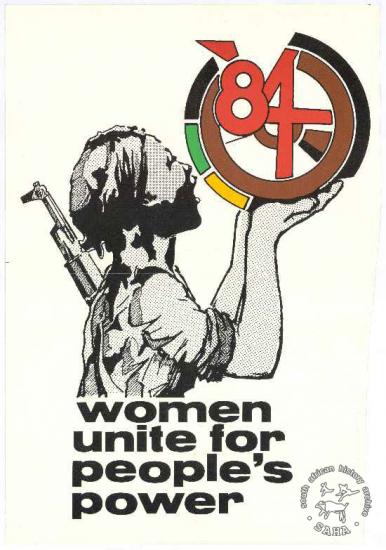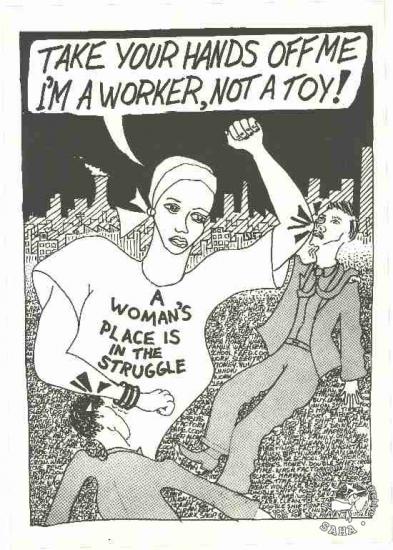
The recent #TotalShutDown march by women and gender non-confirming activisits was a reminder of the collective power that women can wield for change. And yet such a powerful movement was not without its detractors. In the present climate of South Africa’s heavily politicised women’s struggle, it is important to pause and consider the history of women in the armed struggle for freedom of South Africa. Perhaps, by going back we can remind ourselves as a people of what it was the strength of women stood for. An important but peripherized role of women, not only as activists and agitators but as fully fledged combatants in the greater armed struggle is an excellent place to start.
When analysing the complex and multifaceted history of the liberation movements in exile from a gendered perspective one often runs up against a recurring problem- women’s roles have largely gone unrecorded and only nominally recognized in the many histories and annals that have since been published. The causes for this are perhaps not entirely unique to South Africa. For a long stretch of recorded human history the belief has reigned that armed conflict is the exclusive preserve of maleness and masculinity, with the input of women in turn being viewed as little more than auxiliary and supplementary to the efforts of their more vital male counterparts.
History tells us that this narrative is false and women have played far more prominent roles in the armed struggles than is recognised. Women of color activism has been a feature of our nation’s politics since at least 1911, when the first anti-pass protests led by women took place. Throughout that time women organised and participated in politics. The movement led by women would go on to reach a peak point from 1976 onward, in much the same fashion as it did for men. 1976 was there year of the horrific June 16 Soweto riots, which saw girls and boys stand shoulder to shoulder together against the full unbridled brutality of the apartheid security forces (for more information on June 16th and its significance for more contemporary struggles in education, click here). There are numerous accounts of the stories of women that have been told.
One fine example of such a retelling is “Aspects of the experiences of 10 women in MK” by Kongo Louis Makau. In it one finds an enlightening history of uniquely female experiences in the most important armed faction in the battle against the apartheid government. These are tales of anguish and anger over injustices, detention and torture, of unparalleled heroism that saw these women reject their defined roles as passive onlookers and trek across dangerous distances to join their male comrades as trainees and ultimately full-fledged fighters operating out of a multitude of bases across the Sothern African region. Perhaps most poignantly it also highlights deeper often unseen struggles as they strove to gain the full acceptance among fellow fighters who could at times be dismissive, contemptuous and abusive in a manner not always very unlike that patriarchy which they were collectively raging against. Although there are countless, nameless heroines in the struggle, there a few that whose stories are unique .

Thenjiwe Mtintso, a famous student activist, trade unionist and ANC member who would later face torture at the hands of the security police recounted how MK commanders would often abuse their positions of authority to sleep with new female recruits. The issue reached such severity that Chris Hani, leader of MK, would later institute rule 25, which specifically forbade the practice. As there was no official sanction for this sort of abuse, it would often crop up in different forms. One such time was during the so called “brushman affair”, when female members in one of the training camps reported that a male member was sneaking into their barracks at night and fondling them. When they pursued him he hid in the male barracks and the incident caused a rift in the camp which divided the fighters along gender lines, leading to the so called “anti-muhlere campaign,” in which the men in the camp refused to speak to the women. Other forms of abuse such as taunting and general disrespect was also rife.
Mtintso would later recount this general atmosphere of disrespect during the TRC hearings.
“This consistency of drawing away from your own activism, from your own commitment as an actor, was perhaps worse than torture, was worse than the physical assault, when even what you have stood for is reduced to prostitution, unpaid prostitution”
Source: TRC Report Vol. Four Chapter Ten: Special Hearing: Women, p. 304, paragraph 91
Thenjiwe’s account is important and perhaps speaks to the ongoing crisis of lack of adequate response and sometimes frankly shocking behaviour by women in protecting male counterparts when they are accused of gender based violence or sexual assault. This attitude stems deep from the notion that the struggle for women’s rights must always be periphery to the broader struggle for racial equality. Essentially this argument is that if a man does “good work”, his abuse, whilst not condoned, must be forgiven for the greater good. It is the woman’s role to sacrifice her dignity and peace. Thankfully there have always been women who have fought back against this indifference to women’s worth, such as Thenjiwe, who inspire the present generation to refuse to continue women’s struggles in the back.

Women contributed in various forms to the armed struggle. Some of our greatest soldiers died at the hands of the inhumane apartheid State because they dared to dream of a better South Africa. Women like Nokuthula Orela Simelane, who died under torture at Vlakplaas and the legendary Dulcie September, who was assassinated by an unknown gunman outside the ANC offices in Paris just as she was about to reveal incriminating evidence of arms smuggling between France and South Africa. No convictions have arisen out of these incidents, with those implicated in Simelane’s murder remaining adamant in their claims of innocence and the identity of September’s killer and their handler likely to remain a mystery forever. The indomitable late Victoria Mxenge who was bastion of hope and a brilliant legal mind, gunned down in front her children by hired murderers.
In this 2018 would have been the 100th year of the birth of Mam’ Albertina Sisulu. She was a struggle icon who fought passionately for justice and the hope of a fairer South Africa. The women’s live should serve as markers for what is possible and a decide refusal to shrink back in the face of trials but to persevere towards justice, no matter the obstacles.
Through the dedicated work of our Archive and Freedom of Information Program we help honour the sacrifices of these women activists and others in the pursuit of their human rights through the pursuit of truth and the ability to hold the powerful to account. We hope you will join us this national women’s day in celebrating all that they helped achieve for our generation and those to come.










